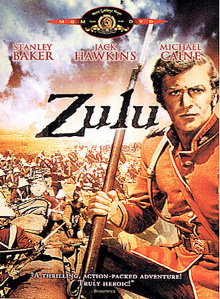
I’m pretty sure I added this film to my ever growing list due to its specific notability as a war film. Its director Cy Endfield doesn’t seem to have made anything else of comparable stature and while the promotional materials for it now prominently feature Michael Caine this was actually his first major role and he only plays a supporting character here. Yet it is a fantastic war film and easily one of best I’ve ever seen about a single battle, while managing the almost miraculous feat of not being too racist.
At the onset of the Anglo-Zulu War in 1879, the Zulu army defeats a large British force. Lieutenant Gonville Bromhead is in command of a small medical post at Rorke’s Drift when he receives a warning of an impending attack. However also present is Lieutenant John Chard of the Royal Engineers who is nearby constructing a bridge. Chard demands overall command due to his slightly earlier date of commission and Bromhead grudgingly gives in. As they have less than 200 men, including many sick and wounded, and the incoming Zulu force is estimated at around 4,000, their situation seems hopeless. In particular, a pacifist Swedish missionary who is based there keeps trying to persuade them to flee and a contingent of Boer horsemen pass by but refuse to stay to help. Yet Chard decides to stay to defend the position anyway and does what he can to fortify the defences.
This is of course based on a real historical event and the film seems to have faithfully captured the broad strokes of the battle. Many of the individual stories seems to have been wholly invented however while retaining the real names of the people involved but I think that is acceptable as the main point here is the battle itself. Indeed this is a tightly focused film as it concerns itself with the battle and nothing else, not even the prior engagement at Isandlwana nor the background of the war. The only digression is a mass Zulu wedding ceremony attended by the missionary Otto Witt that takes place shortly before which serves to show us who the Zulus are. This singular focus as well as the refusal to delve into any detailed characterization of the Zulus themselves helps keep the film from being too racist. We only ever see things from the British perspective who regard the Zulus as more like a terrifying force of nature. The director even shows the Zulus allowing the Witts to retreat peacefully and plays up the noble warrior stereotype. What is surprising is how the film completely slags the reputation of Witt as a useless, nerveless pacifist who does his best to incite cowardice in the soldiers.
The real draw of the film however is its detailed portrayal of realistic battlefield tactics. Rather than attacking in a single massed charge, the Zulus employ careful tactics of their own. Their first attack is a feint, sacrificing men to ascertain the number of rifles the British have available. They probe the defenses, attacking on different sides and determine that the hospital building is a weak spot. Though their marksmanship is awful, they make use of the rifles they scavenge from the earlier battle to harass the defenders. Meanwhile Chard insists on building multiple lines of barricades with fallback points and call for disciplined volley fire to break the charges. He even does his best to hide his soldiers to conceal his true numbers and organizes a flying platoon to shore up breakthroughs. It’s amazing how well they show the back and forth of battle and ensure that the audience is never amidst the chaos of battle. One problem may be that it can be hard for audiences to understand why a single, overwhelming charge couldn’t work as the film merely shows the Zulu leader issuing orders but we never get into his mind to understand what he’s thinking.
The upshot is that if you’re a strategy gamer of any stripe at all, you owe it to yourself to watch this as it simply is just that good. The lack of the usual objectionable racism even ensures you don’t even need to feel guilty about watching it. The only thing that you need to put up with is the exaggerated British stiff upper lip phenomenon in which the soldiers evince stoicism and even joviality in the face of imminent danger. It’s their way of showing that civilisation and discipline prevail no matter the circumstances but this film takes it to a rather comical extreme.